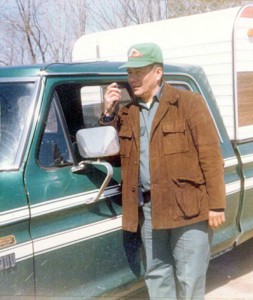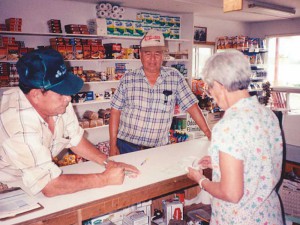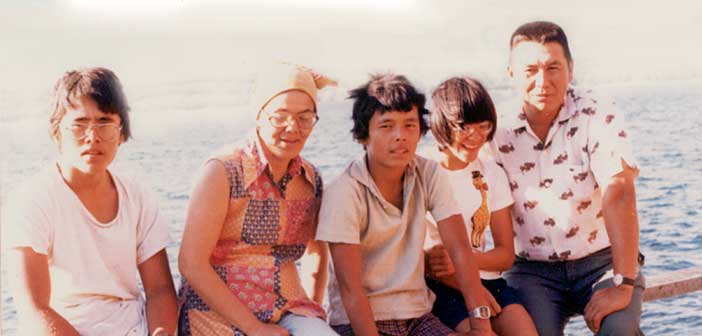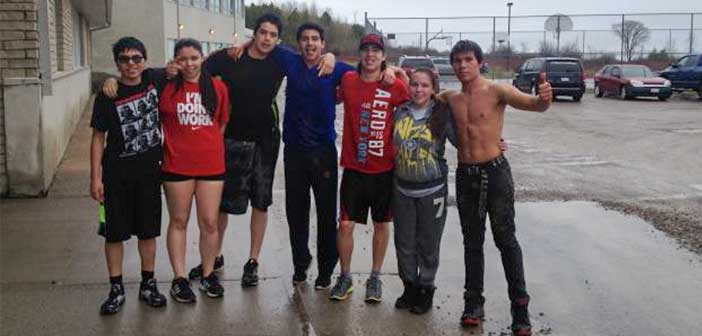Jim McGregor met this writer at the store his family built in Birch Island at the McGregor Bay community dock. His home overlooks the very harbour he has lived on since he was born. He smiled warmly and extended his hand as this writer approached. His congenial manner continued to be displayed over the next two and a half hours while he shared his history as a resident and former chief of the Whitefish River First Nation. Jim lives alone now, in the big home he helped build and shared with his wife Georgina until she died in 2001, one month after being diagnosed with cancer. “My last happy image of her was sitting up, thoroughly absorbed by the beautiful flower bed she had nurtured at the side of our home. It was a crisp sunny day in May, just like the day we married.” Tender moments like this help Jim cherish the happiness that lasted for so many years.
Jim was the first child of Joe and Agnes (nee Misinishkotewe) McGregor, born on August 25, 1938. He would have a brother Lawrence, a sister Elaine, and another brother Dennis as well as three half-sisters and one half-brother on his mother’s side. “My dad had five brothers and three sisters but two died at a very early age. My maternal grandparents died before I was born but I did get to know my paternal grandfather, Gregory McGregor. We spent many hours fishing together. He also taught me how to make a flat-bottomed boat, but I never had the opportunity to use that skill.”
Christmas time meant going to church and visiting family in Wikwemikong and Birch Island. Jim’s mother would make Christmas cake and bring out the preserves. “We always had a tree and special treats for Christmas.” Jim had chores as did his siblings. Their log cabin was nestled beside a big garden that needed weeding to produce the vegetables that would be stored in the root cellar come fall.
[pullquote]Christmas time meant going to church and visiting family in Wikwemikong and Birch Island. Jim’s mother would make Christmas cake and bring out the preserves. “We always had a tree and special treats for Christmas.” Jim had chores as did his siblings. Their log cabin was nestled beside a big garden that needed weeding to produce the vegetables that would be stored in the root cellar come fall.[/pullquote]
“Mother would call one of us to get the turnips from the root cellar. In the winter, that could mean snow up to the waist, but once inside the cellar, it was always warm no matter the season. We didn’t have a fridge in those days,” Jim explains. “To get to the grocery store, we harnessed our horse team to a sleigh in the winter, a wagon in the summer. That was standard for most families.” Once the weather warmed, Jim and Harold would ride the horses bareback despite their father’s wishes to the contrary. He felt they were working horses and should not be used for play.
In wintertime, a sleigh was used to fetch the logs cut in the bush. “We learned quite early how to work hard, helping our dad. We cut pulpwood and stove wood for two dollars a cord. The pulpwood would be dragged on the skidders to the water so the logs could be peeled in the spring. A gang of us would push the logs into the water and manoeuvre them into booms. A local boat would pull these booms to the big ship where a conveyor belt pulled up each log onto the big ship. These cargoes were destined for Green Bay, Wisconsin.”
In 1945, the paper mill in Espanola re-opened after the Second World War and the logs were shipped there for processing. The mill had been the site of a camp for German prisoners during the war. “I remember going with dad to the store in Whitefish Falls and seeing some prisoners there. They wore big overalls with a large red circle on their backs and they were closely watched by the guards. They worked on local roads. Once, a few of us were in the woods and we saw a prisoner trying to escape. That was quite thrilling, but he was recaptured. Ironically, many of the prisoners didn’t want to go home to Germany after the war. Some did return but when they saw how much Germany had changed, a few came back again to marry local girls and make a new home in Canada. I have always been curious about Germany. Later, when I worked with a German man my age at INCO, I asked him lots of questions about his former country.”
“One of the biggest events of my childhood was the wartime holiday visit of President Franklin Roosevelt the first week of August in 1943.” This was just prior to a high level conference in Quebec in mid-August, where he met other world leaders including Canadian Prime Minister William Lyon McKenzie King, and Britain’s Prime Minister Winston Churchill at the Chateau Frontenac. They met to discuss the status of the ongoing war, including plans for the eventual D-Day landing.
“We are not sure exactly where he stayed. Of course there was a deliberate attempt to protect the president by not sharing that information. He spent time in his railway car, adapted for his use and in a large boat he also fished from. He may have stayed with the friends at a ‘Bay of Islands’ cottage that belonged to the MacDonald family who had invited him to come. There were lots of military vehicles on the highway at the time. We could not go beyond our gates up at the top of the hill here in our community, so many of us gathered there at different times hoping to catch a glimpse of the president but I never saw him.”

Another war memory for the young lad was his cousin Theodore McGregor, still in his teens, leaving for war. “I remember him walking slowly down the hill from his house, turning and waving good-bye to his parents who were standing quietly in front of their house. Community members were all watching, wanting to say goodbye. At the bottom of the hill, he got in a Jeep and was slowly driven away through the community. He came home once, after he was wounded. Then he left again the same way. The Jeep came and everyone waved goodbye again. He never came back.”
“In 1944, our chief got a letter from Holland from a Dutch family that had put Theodore up two nights. They wanted his family to know about the time they had shared with him. The chief gave the letter to Theodore’s family. His mother and his sister really appreciated hearing about him. The Dutch couple came here in the late 1970s when Jim was chief. Theodore’s sister was working in the band office and she was happy to meet them and share some stories. What a treasure for his family to learn a little more about Theodore and be able to cherish a few more memories.”
School was in Birch Island. “It was the best school in the world. The teachers were good. If there was a problem, then I had caused it,” he injects, smiling. “We all knew each other and we could speak our own language. My dad told us quite emphatically, ‘as long as you are going to school, you have a home here. If you quit…’ then he hesitated and very deliberately pointed at the door.” The message was clear. The residential schools were just shutting down so I didn’t go there. I went to the high school in Little Current instead. It took a while to learn to speak English and comprehend a different culture but we soon got used to each other and got along well.” Softball and hockey were the team sports that Jim and his friends pursued.
“We used to cut the reeds and clean the snow off the swamp near our house so we could play hockey. We could skate after supper on a beautiful crisp clear night. The winter moon shining on the snow always held a special attraction. The older kids had their own rink, made more official with boards at the perimeter. Eventually we all played there against other teams from Tehkummah, Manitowaning and Little Current. We used catalogues for shin pads and generally made our own equipment. We only played ‘shinny’ hockey, not the rough stuff at first.”
Jim’s first job was at Hawken’s saw mill just south of Birch Island for five dollars a week. After high school was finished, he was offered work in Detroit. The owner of the City Bus Line had asked him to come to Detroit. He needed a guide for his guests. “I was 19 when I talked to my father about moving to the American city and he supported my decision. I lived in the owner’s residence and looked after the lawn for the first month. Then I was promoted to cleaning busses and taxis in his Grand Rapids garage. One day they asked me to fix some flat tires on a taxi. I tried to repair the tires but the next day the supervisor marched me to the garage bay and pointed at the vehicle I had repaired. ‘See those tires?’ he asked. I looked and noticed all my tires were flat. I had to re-plug them all so I quickly learned how to do it right.” Jim stayed for about two years then longed to go back home. “It was a good feeling when the manager told me I was welcome back any time.”
Jim applied for work at INCO but the scale in their medial office claimed he weighed only 148 lbs; two pounds less than the required 150 lbs. “I spent the next few days eating a lot and drinking beer but managed to gain only one pound. I guess they thought that was close enough and they hired me. I went to the smelter first then moved to Creighton Mine where I did maintenance work. Slag spills and furnaces had to be cleaned up. My last job before I left INCO was at the Crane Hill Mine, servicing machinery in the mechanical department.”
In 1958, Georgina, born in Wikwemikong, came into his life. “I met her at the hospital in Little Current where she was working. It all started with a smile and a friendly ‘hello’. She was very approachable and ‘easy’ to know. She wanted to go back to school for a year to finish her nursing diploma and I encouraged her to do that. We began to date and we were wed on a brilliant sunny May 15, 1962 in the big church in Wikwemikong. Breakfast was at her brother’s place in Wiky. The reception and dance were held in Whitefish Falls, just up the road.” Jim had bought a used car so he could reassure his wife with regular visits to Wiky.

“My dad gave us a small 16’ x 24’ building on the family property. We renovated it and stayed there for eight years before we built our next home. We had two sons, Harold and Gerry and a daughter, Colleen. I was busy those years so Georgina did much of the rearing but when they were old enough I took the kids hunting and fishing.”
“After a few years in our small home, I had promised that ‘one of these days I am building a bigger house’. In time, we hired a contractor to construct the basement and then we waited until we had more money to proceed. Eventually we had a four-bedroom house. The electrical work and plumbing were contracted out but we did much of the finishing work ourselves, including the drywall and painting. We have since totally renovated the kitchen too.”
Jim was working at three jobs when he was elected chief of his reserve in 1964. He was still employed at INCO and at home he was helping to run the family’s store and marina. His father had built a parking area and docks for boats. Jim and Georgina had added the store and the gas pumps. In due course he decided to end his INCO job, even though it paid so well. His family and his work for the community took precedence.
While Jim was chief, he and his council put a subdivision into Birch Island and they built a marina on the Bay of Islands side of Birch Island, a project that had been started by the previous chief. The land for the cement plant was leased to Canada Cement (now Lafarge). This was another project that had been begun by the previous chief and council. They also added to the capital equipment the band owned. They bought or upgraded the grader, two dump trucks and a skidder. At the neighbouring LaCloche Island property, Fisher Harbour had been an ongoing negotiating process with previous chiefs and continues to be so. E.B. Eddy, the Espanola paper mill, was given permission to cut wood in the area. A sawmill was built between the cottage lots and the cement plant. This mill employed three to four people but it had to be shut down. It was hard for the band to compete with the bigger mill.
Lastly, Jim was involved with four other men in setting up the Little Native Hockey League that has grown enormously, far beyond expectations. “Reverend Len Self from DIAND (later INAC) in Sudbury was trying to promote sports and he approached us to take on this initiative. He agreed to help organize the first year. Norman Debassige, James Debassige and Earl Abotossaway joined our team to take on the administration of this annual event begun at Christmas 1971. The first tournament in Little Current had 17 teams and 200 players participated. Many Manitoulin and North Shore communities, Espanola, and Six Nations have hosted the Little NHL since those early days, the Little NHL founder observes, noting that the March break event now is an important week for 2,000 participants and their families.
Today Jim’s son Gerry is on the executive and the event is so large it has to be hosted in Mississauga, west of Toronto. Five rinks with three to four ice pads each are available. Sudbury could not house or accommodate all the teams. Now there are over 2,000 players on 110 teams. “It has grown quickly” Jim quips, smiling, “What else can you do for March break?”
The Little NHL web page quotes him this way: “Jim believes that hockey was not only a great sport but it also built upon personal character and strength” This is the foundational thinking behind the annual event for Jim. He believes that hockey has helped shape both the skill level of youngsters and added to the character and self-esteem from having done a job well. “Hockey seems to be all they talk about. They are comfortable with each other and they like to work together. Hockey is important but they need school too, to have an academic goal, a ‘dream’ to pull them forward in life.”
“Son Gerry was in the armed forces, a paratrooper for ten years and he was stationed in Germany for a time. Before he came home, we asked him to check out his cousin’s grave. He did find the grave in a very large cemetery in Holland. We have a picture of him kneeling in front of Theodore’s grave. That was a very moving photo.”
[pullquote]“When I got back home, I could be much more objective about our own home. I realized what that American man had said about our Birch Island and the Manitoulin area was right. We do live in paradise!”[/pullquote]
These days, Jim takes it easy. He has been alone for 13 years but he has adapted to this and he lives one day at a time, overlooking stunning McGregor Bay. He misses Georgina. He is proud of their offspring. “Children are gifts to the married couple,” he adds. “I am proud of my grandchildren too.” Sometimes he thinks back to his own childhood, to the innocence of youth before debts and politics. “Not everyone will agree with me, but sometimes I wish our community hadn’t changed from earlier times” he shares. “As for our kids, I encourage them not to shy away from work. Enjoy what you do and try to make the best of it. Try to get along with everybody.”
Jim’s friendliness is contagious. He claims he has no quarrel with anyone and he is always willing to listen. He remains curious about his world and the people in it and this curiosity compels the ex-chief forward. “Not too long ago, I was in Little Current talking to my old school chum Doug Hore. We were looking at an old school photo and we both realized, with some chagrin, that there were only a few of us left.”
Jim has no specific ambitions, but he still helps his son with the log splitter from time to time. He also plows the snow off his driveway with his tractor. “We do live in a special place here. I am reminded of a day in May, when an expensive car came down the hill. An American man got out of his car, chatted a minute and then hesitated as I began to pump the gas. He was admiring the landscape. “Jim, you don’t realize that you live in paradise,” he declared. Jim responded, “Thank you very much.” This well-to-do man was a world traveller but he appreciated this little corner of the world. “Hockey player Al Secord, who played for several teams in the NHL in the 1980s, and whose parents lived near Espanola, seemed to like it here too. He was a frequent visitor when he was in the area.”
Jim was proud to have been chosen along with Jim (Simon) Mishibinijima, Rita Corbiere and two others to visit Rome. Luckily, one of the ladies spoke French. “We went to display Anishinabe arts and crafts under the umbrella of the Ojibwe Cultural Foundation. We were away for three weeks. Thankfully, our French-speaking lady was able to translate for us. Most Italians can speak French and other European languages,” he offers in conclusion. “I had looked up some of the history of Italy in advance, and it was exciting to see some of the actual places I had seen in books. It was enriching to experience the culture, see the people and the elaborate ancient fountains. The mountains were interesting too.”
“When I got back home, I could be much more objective about our own home. I realized what that American man had said about our Birch Island and the Manitoulin area was right. We do live in paradise!”




